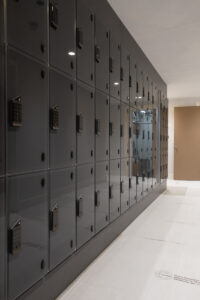The use of smart lockers is becoming more relevant than ever as we work through the challenges of modern life. In this blog, we will explore the benefits of smart lockers and why in today’s fast-paced and increasingly technological, they are not just a convenience but also an essential.
Eco-friendly solutions:
In a time when environmental concerns are front of mind worldwide, smart lockers help to promote eco-friendly behaviour. These lockers reduce the carbon footprint associated with typical parcel delivery services by streamlining delivery routes and decreasing the need for redelivery efforts. Additionally, the material of the lockers in a variety of sectors from leisure lockers to commercial lockers, can also reduce the carbon emissions that were being used in the past, creating sustainable lockers.
Enhanced security
Security concerns have always been a top priority, and smart lockers increase the security of goods that are kept within the storage. Lockers are equipped with advanced locks to identify the users such as a one-time code, some locks are equipped with RFID wrist straps or RIFD fobs, which offer extra security against any theft or not permitted access.
Round-the-clock accessibility
The traditional 9 to 5 workday is gradually changing from the workforce. Smart locker’s 24/7 accessibility fits in perfectly with the active lifestyle of the modern person. Smart lockers guarantee that customers may access their items when it’s most convenient for them, whether it is to retrieve a package on the weekends or to take their belongings a few hours after working hours.
Conclusion
Smart lockers are becoming more than just a handy tool; they are an essential part of our everyday existence. The importance of smart lockers has recently increased as we overcome the challenges of a world that is changing rapidly. Technology provides a look into a future when technology not only improves our lives but plays a crucial part in how we interact with the environment around us, from contactless convenience to sustainable practices

